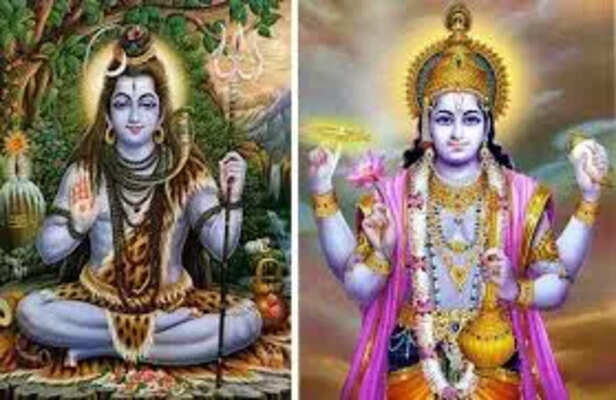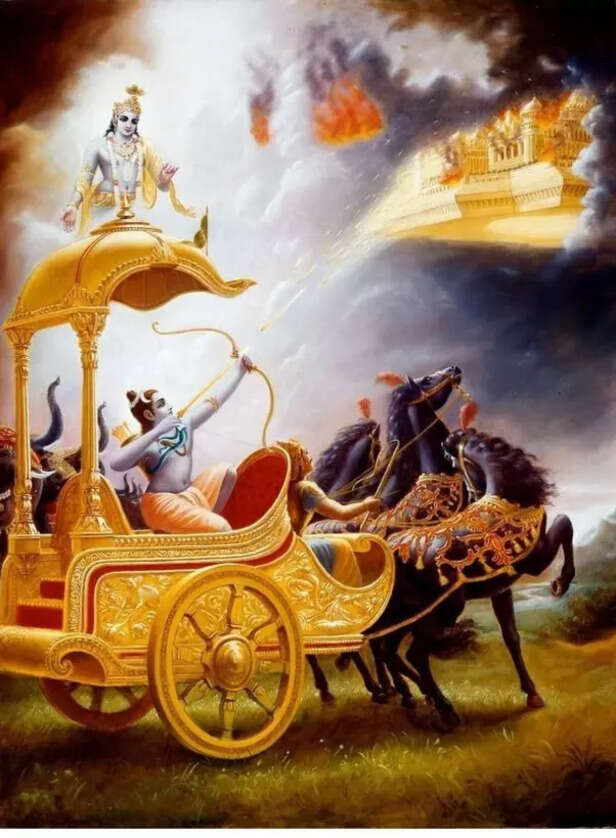Who Was More Powerful? A Riveting Analysis of Shiva vs. Vishnu!
Nikita Kanyal | Jan 20, 2025, 22:14 IST
Image Source : Pinterest
Is Shiva, the universal destroyer, stronger than Vishnu, the guardian of balance? Engage in this thrilling exploration that contrasts Shiva’s raw, ascetic strength with Vishnu’s tactical intelligence and control over illusion. Through legendary tales such as Shiva’s Tripurantaka accomplishment and Vishnu’s clever Narasimha incarnation, we investigate how these divine powers work together to maintain the universe. But who genuinely holds the highest authority? The revelation might astonish you as we unveil deep philosophical understandings and the eternal cooperation of these two cosmic giants!
In the extensive tapestry of Hindu mythology, few topics spark as much interest and passion as the enduring inquiry: Who possesses more power, Shiva or Vishnu? Both revered as supreme deities, Shiva and Vishnu represent different but equally important aspects of the divine.
The Divine Roles: Destruction vs. Preservation

Shiva, frequently referred to as the “Destroyer,” operates as the cosmic energy accountable for the destruction and transformation of the universe. Nonetheless, destruction in this sense is not disorder but a crucial process for renewal. It is the deep dissolution that creates room for new creation. Vishnu, the “Preserver,” maintains cosmic order (‘dharma’) and ensures the sustenance of the universe. His avatars, including Krishna and Rama, descend to Earth during times of significant turmoil to restore equilibrium.
While Shiva signifies the ultimate void and detachment, Vishnu personifies the caring and safeguarding facet of divinity. This juxtaposition is crucial destruction and preservation are two aspects of the same cosmic coin.
The Power of Tapas (Austerity) vs. Maya (Illusion)
Shiva’s power lies in his unparalleled ascetic practices. Considered the ultimate yogi, he is able to disconnect from the physical world, channeling great energy through meditation. Stories of his Tandava—the dance of annihilation—demonstrate his fierce, primal strength that could obliterate even the deities if set free.
On the other hand, Vishnu’s power is rooted in his mastery over Maya, the divine illusion. Through his avatars, he uses strategy, wisdom, and compassion to guide humanity. Krishna’s counsel in the Bhagavad Gita exemplifies his intellectual prowess and ability to lead.
The choice between ascetic strength and strategic wisdom isn’t straightforward. Each complements the other, creating a harmonious balance in the universe.
Shiva: The Destroyer of Tripura

In the myth of Tripurantaka, Shiva single handedly destroys three mighty demon cities (‘Tripura’) with a single arrow. This demonstrates his unparalleled destructive power a force that even the gods rely upon in times of extreme crisis.
Vishnu: The Savior as Narasimha
When the demon Hiranyakashipu grew invincible with a boon that made him immune to death by man or beast, day or night, indoors or outdoors, Vishnu’s avatar Narasimha a half-man, half-lion defied all constraints to slay the demon at twilight on a threshold. This illustrates Vishnu’s ingenuity and ability to outwit any adversary.
The Philosophical Perspective: Beyond Duality
From a philosophical viewpoint, the discussion of Shiva versus Vishnu illustrates human inclinations to categorize the divine. In Advaita Vedanta, a non-dualistic philosophical system, both Shiva and Vishnu are seen as expressions of the same ultimate reality (‘Brahman’). The seemingly distinct differences are merely indications of their functions within the cosmic cycle.
Even in mainstream worship, the Harihara form a combination of Shiva and Vishnu represents their oneness. The takeaway? The divine is singular, appearing in various forms to assist humanity.
So, who holds greater power? The answer varies based on individual viewpoint. Shiva's energy is primal, chaotic, and beyond limits, while Vishnu's energy is systematic, supportive, and integrative. Both gods represent complementary aspects of reality, and their powers are essential for preserving the universe's balance.
The question, then, is not about dominance but cooperation. The universe thrives because of their combined force Shiva's ability to disintegrate and Vishnu's ability to uphold. Together, they ensure that the cosmos perpetuates its infinite cycle of creation, maintenance and dissolution.
The intrigue surrounding Shiva vs. Vishnu resides in its more profound ramifications. It’s not merely a matter of divine authority but a mirror of human conflicts: action vs. detachment, strategy vs. power, and transformation vs. stability. By delving into this contrast, we obtain understanding into the equilibrium we require in our own lives.
Perhaps the real takeaway is this: rather than choosing sides, we’re invited to embrace the wisdom of both. After all the cosmos thrives not on conflict but on harmony.
The Divine Roles: Destruction vs. Preservation

Image Source : Pinterest
Shiva, frequently referred to as the “Destroyer,” operates as the cosmic energy accountable for the destruction and transformation of the universe. Nonetheless, destruction in this sense is not disorder but a crucial process for renewal. It is the deep dissolution that creates room for new creation. Vishnu, the “Preserver,” maintains cosmic order (‘dharma’) and ensures the sustenance of the universe. His avatars, including Krishna and Rama, descend to Earth during times of significant turmoil to restore equilibrium.
While Shiva signifies the ultimate void and detachment, Vishnu personifies the caring and safeguarding facet of divinity. This juxtaposition is crucial destruction and preservation are two aspects of the same cosmic coin.
The Power of Tapas (Austerity) vs. Maya (Illusion)
Shiva’s power lies in his unparalleled ascetic practices. Considered the ultimate yogi, he is able to disconnect from the physical world, channeling great energy through meditation. Stories of his Tandava—the dance of annihilation—demonstrate his fierce, primal strength that could obliterate even the deities if set free.
On the other hand, Vishnu’s power is rooted in his mastery over Maya, the divine illusion. Through his avatars, he uses strategy, wisdom, and compassion to guide humanity. Krishna’s counsel in the Bhagavad Gita exemplifies his intellectual prowess and ability to lead.
The choice between ascetic strength and strategic wisdom isn’t straightforward. Each complements the other, creating a harmonious balance in the universe.
Iconic Myths That Define Their Power

Image source : Freepik
In the myth of Tripurantaka, Shiva single handedly destroys three mighty demon cities (‘Tripura’) with a single arrow. This demonstrates his unparalleled destructive power a force that even the gods rely upon in times of extreme crisis.
Vishnu: The Savior as Narasimha
When the demon Hiranyakashipu grew invincible with a boon that made him immune to death by man or beast, day or night, indoors or outdoors, Vishnu’s avatar Narasimha a half-man, half-lion defied all constraints to slay the demon at twilight on a threshold. This illustrates Vishnu’s ingenuity and ability to outwit any adversary.
The Philosophical Perspective: Beyond Duality
From a philosophical viewpoint, the discussion of Shiva versus Vishnu illustrates human inclinations to categorize the divine. In Advaita Vedanta, a non-dualistic philosophical system, both Shiva and Vishnu are seen as expressions of the same ultimate reality (‘Brahman’). The seemingly distinct differences are merely indications of their functions within the cosmic cycle.
Even in mainstream worship, the Harihara form a combination of Shiva and Vishnu represents their oneness. The takeaway? The divine is singular, appearing in various forms to assist humanity.
Who Is More Powerful?
The question, then, is not about dominance but cooperation. The universe thrives because of their combined force Shiva's ability to disintegrate and Vishnu's ability to uphold. Together, they ensure that the cosmos perpetuates its infinite cycle of creation, maintenance and dissolution.
Why This Debate Still Captivates Us
Perhaps the real takeaway is this: rather than choosing sides, we’re invited to embrace the wisdom of both. After all the cosmos thrives not on conflict but on harmony.
